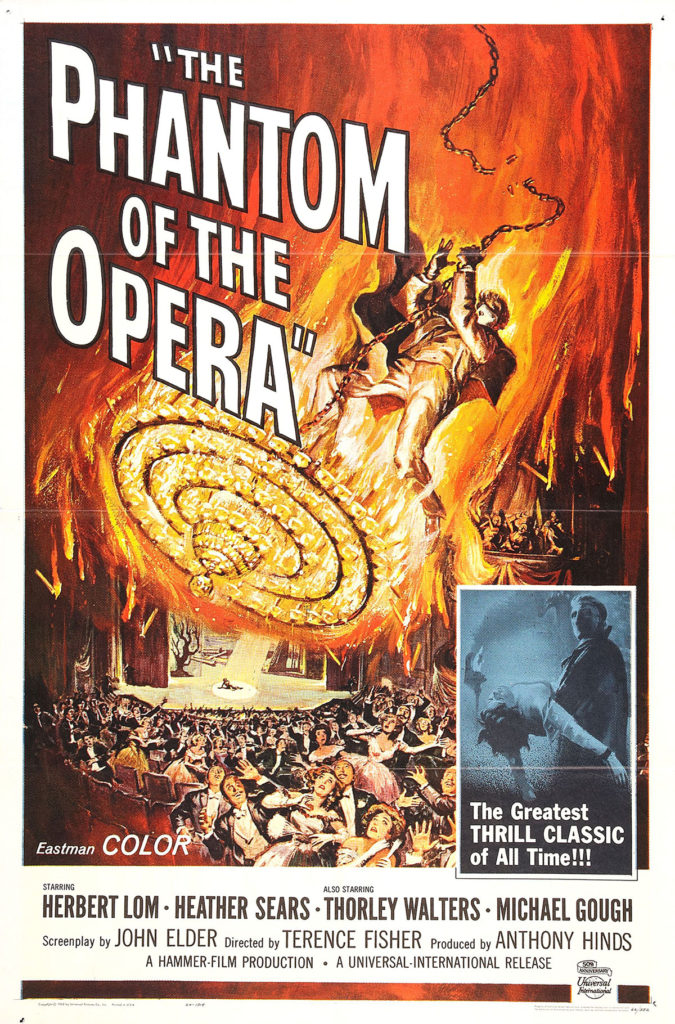Hammer’s version of The Phantom of the Opera may not look it at first, but it is a very significant film in the history of cinema. There have been many, many adaptations of Gaston Leroux’s Le Fantôme de l’Opéra — the most famous being the Andrew Lloyd Webber musical from 1986. But this film, from two and a half decades earlier, was the first Phantom adaptation to feature the phantom playing Bach’s Toccata and Fugue in D minor. That simple decision on the part of the filmmakers to have the phantom banging away on an organ in one scene was the birth of a trope that has crept up in movies, television, and even videogames on a regular basis. Whenever a viewer sees a shadowy figure hunched over an organ and it spits out Bach, it’s all because of this movie.
Directed by Terence Fisher from a screenplay by Anthony Hinds, The Phantom of the Opera tells the story of a seemingly cursed opera being performed in London. The opera is the story of Joan of Arc. It was composed by Lord Ambrose D’Arcy (Michael Gough), who is among the worst characters I’ve seen during this month of reviews. He has a nasty disposition, is abusive to those around him, engages in intellectual theft, and forces prospective performers in his opera to win their roles via a casting couch. I despise characters like this more than typical movie bad guys or monsters, because they mirror so much awfulness out here in real life. The only good thing about D’Arcy is that it is a rare movie where a character like this doesn’t get their comeuppance.
The opera is being plagued by strange events. Sets and equipment suffer damage, sheets of music go missing, and many in the production are convinced the theater they are using is haunted. Nothing seems to be going right. This culminates on opening  night when a member of the stage crew suffers a grisly death while the opera’s diva is blasting out an aria. It so traumatizes her that she bolts the production.
night when a member of the stage crew suffers a grisly death while the opera’s diva is blasting out an aria. It so traumatizes her that she bolts the production.
Never fear, though, because the opera’s producer, Harry Hunter (Edward de Souza) has found the perfect replacement in Christine Charles (Heather Sears). Harry is not the only person who thinks Christine is a star in waiting. She has caught the phantom’s eye as well. Played by Herbert Lom, he is the one responsible for sabotaging the opera, but when he hears Christine, he covets her voice as D’Arcy covets her body. What follows is typical gothic horror, in that there are mysterious deaths and a pursuit of the thing responsible, but it’s also a story about putting on an opera. It floats in and out of the world of the theater, having as much in common with a film like Opening Night or Birdman as it does with The Curse of the Werewolf. And that’s only a slight exaggeration.
One of the things I like about this movie is that a complete story has been packed into its 84-minute runtime. By that I mean there aren’t loose ends to be found anywhere. There are no wasted characters, no free-floating moments in the script, no filler. There are, however, some scenes where the opera is being performed. Edwin Astley composed the music, and it’s ersatz opera. There’s no getting around that, unfortunately.
Terence Fisher has proven to me over this month that he was a capable, and fast, storyteller. He could bang out four or five movies like this in a year for Hammer, and they all seem to have great pace and little dead spots. There’s nothing different here. In addition, almost all of Hammer’s horror catalogue are period pieces. When Fisher is at the helm, they tend to be better realized. It’s not that they are any more realistic, but they never appear slapped together, even though these films very much were.
Hammer films have a weird quality of resembling stage plays as much as films. There’s a lot of suspension of disbelief required of a viewer, and that burden on the viewer is increased when there’s clearly a lack of care when it comes to sets and costumes. That’s never a worry with a Terence Fisher film. He creates an environment that doesn’t tax credibility like other Hammer films. Combined with his innate ability to move things along, that makes his films, including The Phantom of the Opera, worth viewing.
